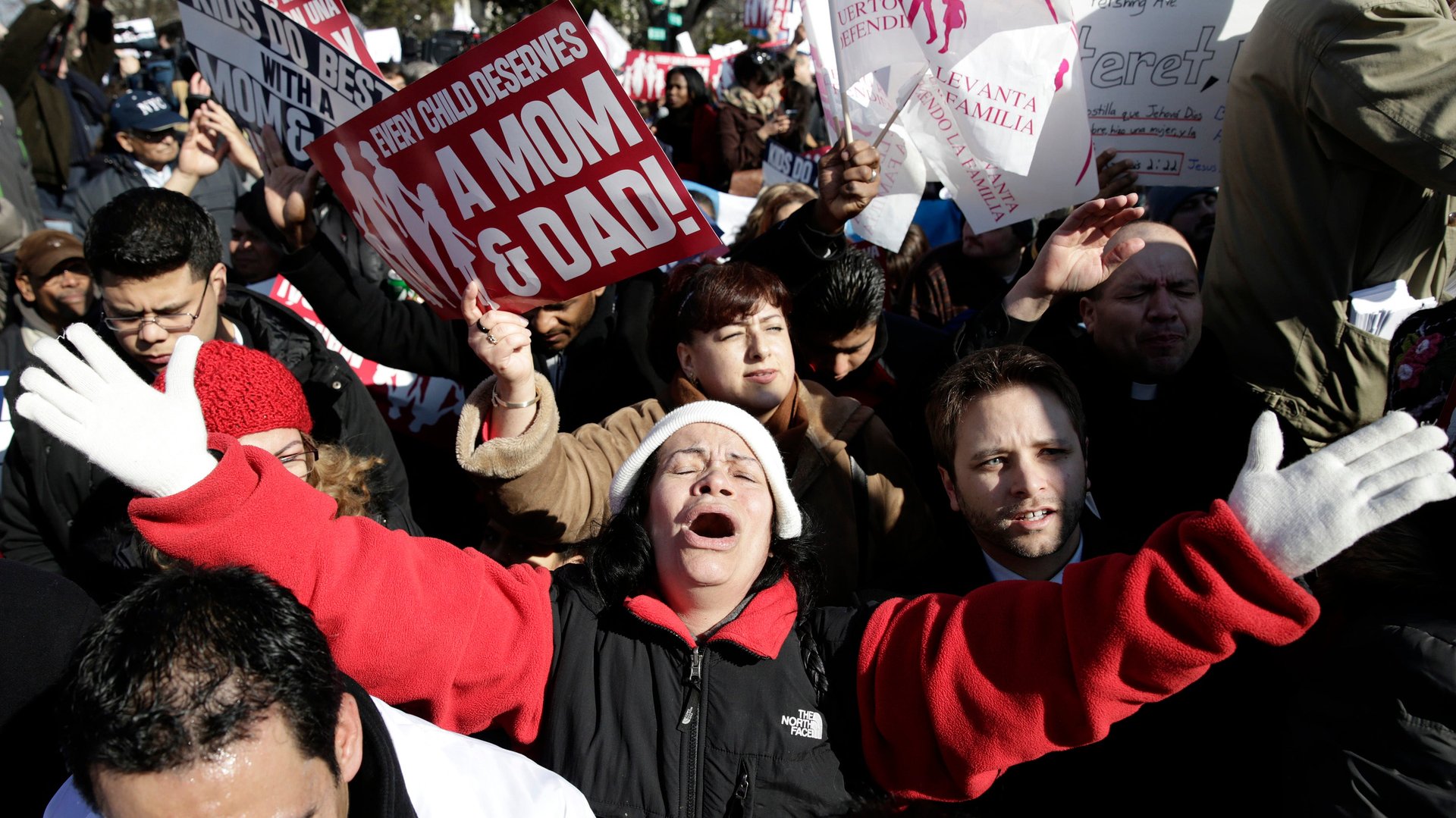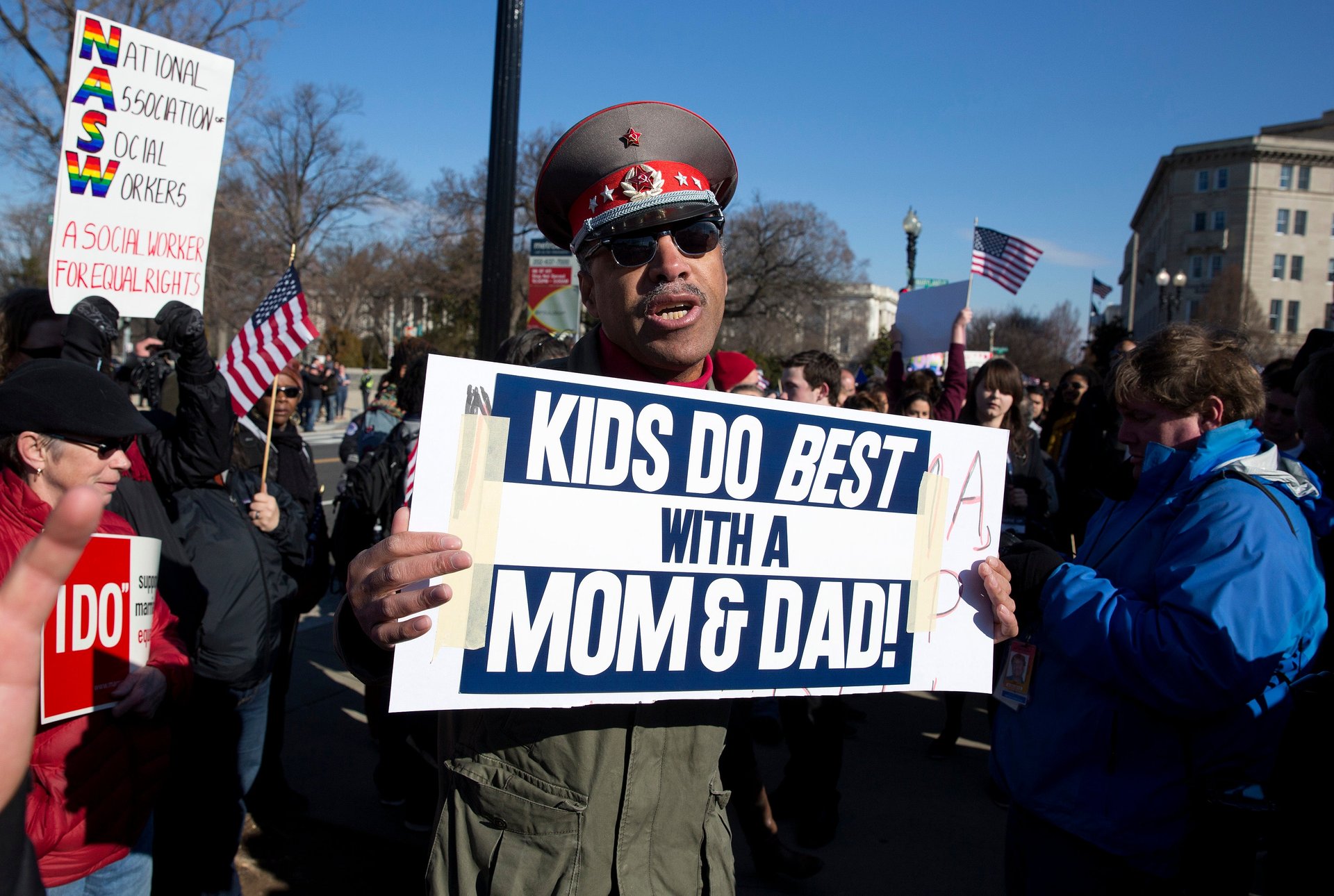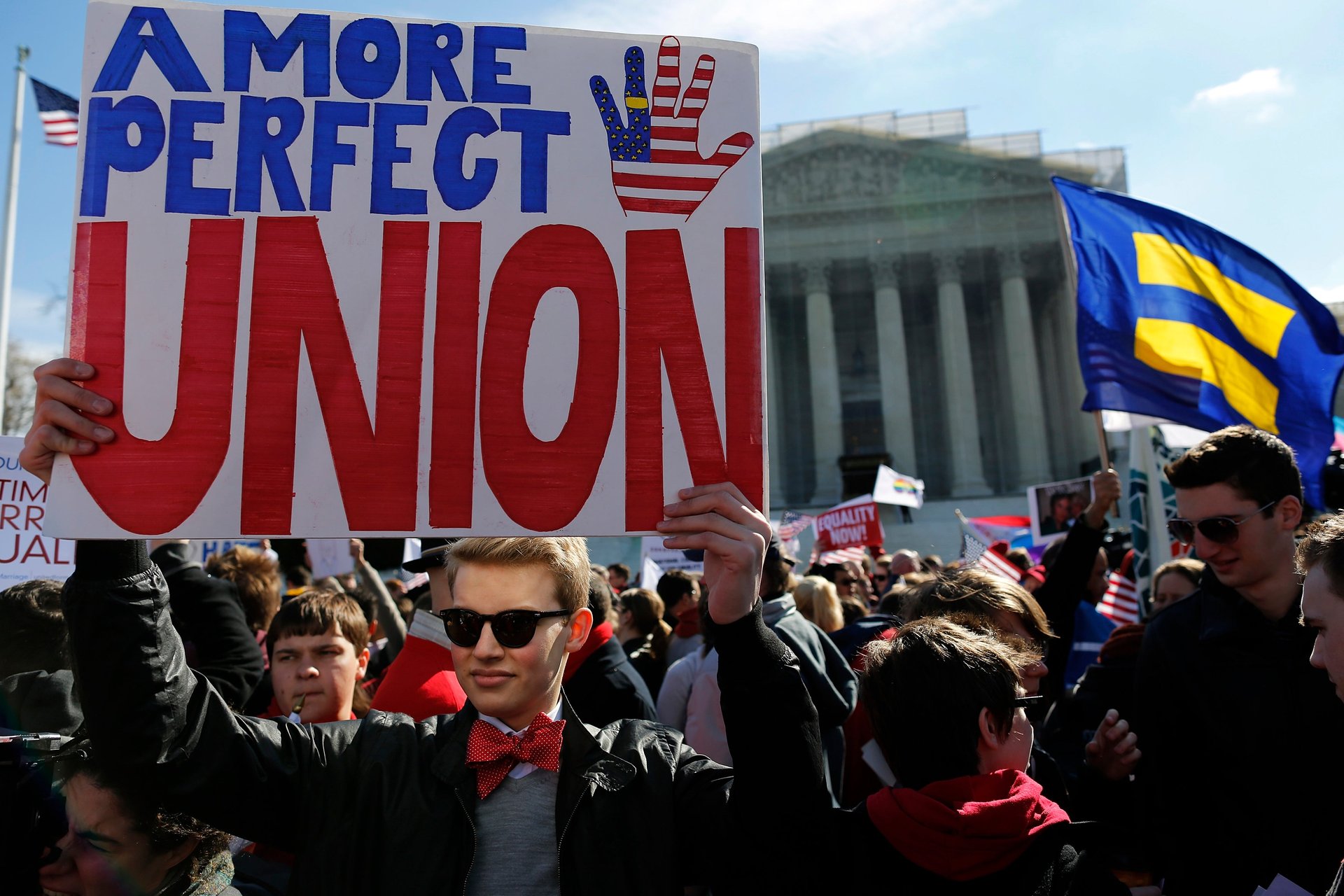Actual US Supreme Court briefs show the desperation of same-sex marriage opponents
On Apr. 28, the US Supreme Court will hear oral arguments in four related cases likely to settle once and for all whether it is unconstitutional for states to prohibit same-sex couples from marrying. The four states defending their traditional marriage laws on Tuesday—Kentucky, Michigan, Ohio, and Tennessee—so far seem to be treading lightly, taking great pains not to offend a court that has issued several landmark gay rights rulings in the last two decades. For example, the state of Michigan’s brief notes that its position is not intended to “disparage the ability of others to provide loving homes or establish a stable, nurturing setting for children.”


On Apr. 28, the US Supreme Court will hear oral arguments in four related cases likely to settle once and for all whether it is unconstitutional for states to prohibit same-sex couples from marrying. The four states defending their traditional marriage laws on Tuesday—Kentucky, Michigan, Ohio, and Tennessee—so far seem to be treading lightly, taking great pains not to offend a court that has issued several landmark gay rights rulings in the last two decades. For example, the state of Michigan’s brief notes that its position is not intended to “disparage the ability of others to provide loving homes or establish a stable, nurturing setting for children.”
There is no mention in the state briefs of natural law or biblical injunctions and no specter so far raised of a future full of legalized polygamy and “man on dog” relationships. Unfortunately, this relative level of restraint is not always shared by the sixty-six amicus curiae parties, or “friends of the court,” that have filed briefs in support of the states’ position. Featured in this eclectic mix—which includes religious organizations, members of Congress, and even same-sex attracted men who are happily married to women—are some truly bizarre, and truly terrible, legal arguments. While it’s no secret same-sex marriage opponents have been on an extended legal losing streak lately, the collective desperation is almost comical.
To honor them, and the creativity of the lawyers who concocted them, here are the five worst arguments against same-sex marriage now pending before the Supreme Court.
5) Traditional marriage laws do not discriminate against gays and lesbians
Many legal arguments in same-sex marriage cases center around what level of scrutiny the court should or should not apply to laws that exclude LGBT people. The Family Research Council (FRC) steers clear of this question by arguing that traditional, “opposite-sex” marriage laws are not discriminatory at all because everyone, straight or gay, is free to marry to someone of the opposite sex.
This argument is not new—it has been advanced and mostly rejected by other courts—but the FRC does add something novel to the mix. “That laws reserving marriage to opposite-sex couples do not discriminate on their face between heterosexuals and homosexuals is borne out by the remarkable (but heretofore unnoticed) fact that dozens of the plaintiffs in the same-sex marriage cases that have been brought over the last twenty-four years previously had been married to a person of the opposite sex.”
The obvious problem with this argument is the plaintiffs’ stated goal are not demanding merely the right to dress their sisters-in-law in tacky chiffon dresses or the right to dance awkwardly to Kool and the Gang staple “Celebration.” What they want is the right to marry someone of their own choosing, someone of the gender for which they have a romantic and sexual attraction. The FRC’s position is tantamount to arguing that the government should be allowed to abolish all synagogues and mosques under the First Amendment because everyone is still free to go to church.
4) Marriage equality will cripple the Social Security system
According to a self-proclaimed group of “scholars of fertility and marriage,” granting same-sex couples the right to marry will lead to an inevitable decline in the nation’s fertility rate, jeopardizing “the state’s interests in perpetuating the long-term survival of its citizenry and sustaining intergenerational welfare programs such as Social Security.” Without a sustainable birth rate, these scholars argue there simply will not be enough new workers to pay into the Social Security system.
Like many of the briefs, these scholars highlight the corrosive effects of the plaintiffs’ “adult-centric” view of marriage. Same-sex marriage, they write, implicitly endorses this “adult-centric” model, thereby “diluting the implicit encouragement the institution of marriage provides for procreation by married couples” and sending the “powerful message that procreation is not a valued societal priority.”
The scholars even conduct some back-of-the-envelope calculations, estimating that there will be up to 1.75 million fewer births over the next thirty years due to nationwide marriage equality. But these figures are based on a very obvious causation/correlation fallacy. They assume that the lower birthrates in northeastern states were caused by their early embrace of same-sex marriage, instead of existing as a corollary of unrelated cultural forces that mayend up being economically beneficial.

3) Marriage equality is creating “
a sub-caste of breeder women”
Taking a somewhat different tack, humanities professor Robert Oscar Lopez argues that the legal recognition of same-sex relationships will drive increased demand for egg donors and surrogate mothers. “When gay men want children on demand,” Lopez writes, “such a system requires women to either hyper-ovulate and sell their own genetic material or to carry children and then dissolve the natural bond between them and their offspring,”
Yes, it’s more than a little ironic that marriage equality is being blamed both for ruining our nation’s fertility rate and for the rise of “a multi-million-dollar industry gearing up to the create a sub-caste of breeder women.”
Like many of the most ridiculous amicus briefs, Lopez is not really presenting an argument against legal recognition for same-sex unions. He is instead making an argument against gay parenting, a non-issue in the context of this litigation. As Justice Anthony Kennedy recognized when he struck down a portion of the federal Defense of Marriage Act in 2013, there are already “tens of thousands of children now being raised by same-sex couples,” and subjecting their families to second-class status will only harm the children in the long run.
2) Marriage equality will lead to the country tearing itself apart, Civil War-style
The Texas Eagle Forum, a regional chapter of Phyllis Schlafly’s organization, use its brief to warn of an ominous future: “Our nation could easily fracture into regional social conflict if the court attempts, as it did in Dred Scott, to impose its own provincial view of a fundamental social issue on the entire country.”
In fact, according to the Texas Eagle Forum, this regional strife has already begun, as evidenced by the “numerous states and cities in the northeast and the west announced bans on official travel to Indiana, in order to punish it for protecting religious liberty against homosexual marriage.” Perhaps you missed this news of the forthcoming civil war among the joyous photos of same-sex couples waiting to get married in Oklahoma City, Oklahoma or Birmingham, Alabama.
All kidding aside, the Supreme Court has moved very deliberately, and very thoughtfully, on same-sex marriage. It dodged an opportunity two years ago to issue a nationwide ruling in the case challenging Proposition 8 in California, allowing the issue to percolate in the lower courts to the extent that most states, even conservative ones, have had time to warm to the idea. The Republic, in other words, is likely to survive.

1) Gay dads will flirt with your high school classmates and ruin your wedding day
Attorney David Boyle has gained notoriety in the past for previous briefs in same-sex marriage cases. But his most recent filing on behalf of Dawn Stefanowicz and Denise Shick, adults who were raised by a gay man and a transgender man respectively, may have reached a new level of absurdity.
For starters, it is not a brief at all. Boyle presents no legal arguments, only personal statements written by each of the amicus parties. Stefanowicz, a public spokesperson for anti-gay causes, begins by offering the Supreme Court “some information about me as media guest,” including how to reach her to book an interview.
The main point of this filing is to recount how the childhoods these two individuals suffered as a result of their non-heterosexual fathers. Stefanowicz claims her father attended a school band performance in order to pick up teenage boys. Shick describes the day she got married, writing that she was outraged when her father told her, “I wish it were me in that dress.”
“He stole my special day and made it all about him and his self-centered desires once again,” she said.
There are also stories of physical abuse and very inappropriate boundaries, which, if true, should not be belittled. However, no matter the veracity of these accounts, they do not in any way constitute a valid legal argument against same-sex couples. The experience of these two allegedly abusive family members are hardly representative of LGBT Americans’ right to marry, any more than the seven divorces of Elizabeth Taylor are representative of heterosexuals’ inability to uphold the sanctity of their collective wedding vows.